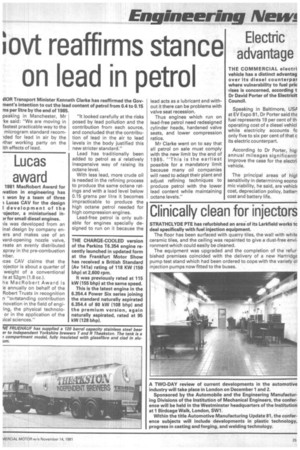;ovt reaffirms stance on lead in petrol
Page 15

If you've noticed an error in this article please click here to report it so we can fix it.
MOR Transport Minister Kenneth Clarke has reaffirmed the Govment's intention to cut the lead content of petrol from 0.4 to 0.15 ms per litre by the end of 1985.
peaking in Manchester, Mr -ke said: "We are moving in fastest practicable way to the microgram standard recom-ided for lead in air by the rther working party on the Ith effects of lead.
"It looked carefully at the risks posed by lead pollution and the contribution from each source, and concluded that the contribution of lead in the air to lead levels in the body justified this new stricter standard."
Lead has traditionally been added to petrol as arelatively inexpensive way of raising its octane level.
With less lead, more crude oil is needed in the refining process to produce the same octane ratings and with a lead level below 0.15 grams per litre it becomes impracticable to produce the high octane petrol needed for high compression engines.
Lead-free petrol is only suitable for engines specially designed to run on it because the lead acts as a lubricant and without it there can be problems with valve seat recession.
Thus engines which run on lead-free petrol need redesigned cylinder heads, hardened valve seats, and lower compression ratios.
Mr Clarke went on to say that all petrol on sale must comply with the new limit by the end of 1985. "This is the earliest possible for a mandatory limit because many oil companies will need to adapt their plant and adjust refining techniques to produce petrol with the lower lead content while maintaining octane levels."






















































































